Noise Complaint Letter To Tenant
[Your Name]
[Your Address]
[City, State, ZIP Code]
[Email Address]
[Phone Number]
[Date]
[Tenant's Name]
[Tenant's Address]
[City, State, ZIP Code]
Subject: Formal Noise Complaint
Dear [Tenant's Name],
I hope this letter finds you well. I am writing to address a recurring issue that has been causing disruptions within our building. As a neighbor and fellow resident, I believe it is important to maintain a peaceful and comfortable living environment for all tenants.
Over the past [specific period of time], there have been consistent instances of excessive noise originating from your unit during late hours of the day and night. While I understand that occasional noise is a part of communal living, the consistent disturbance is affecting the quality of life for other residents in the building, including myself.
The noise complaints primarily relate to [describe the specific nature of the noise disturbances, such as loud music, loud conversations, banging, stomping, etc.]. These disturbances have been occurring on [specific days and times], which is in violation of the noise regulations outlined in the lease agreement and the building's community guidelines.
I kindly request that you take immediate action to address this matter and reduce the noise disturbances. It is essential that we all demonstrate respect for our neighbors and adhere to the guidelines set forth to ensure a harmonious living environment. Here are a few steps you could consider taking:
1. Lower the volume of any electronic devices, including music systems, televisions, and gaming consoles.
2. Avoid engaging in loud conversations or activities during late hours, particularly during the night.
3. Place rugs or soft furnishings to minimize noise from foot traffic within your unit.
4. Communicate with neighbors to ensure you are aware of how noise travels between units.
I believe that by working together and being considerate of each other's needs, we can resolve this issue and continue to enjoy a peaceful coexistence. Please take this matter seriously and make the necessary adjustments to eliminate the noise disruptions.
If the noise disturbances continue unabated, I may have no choice but to escalate this matter to the building management or landlord. However, I am hopeful that we can avoid such measures through open communication and mutual understanding.
Thank you for your attention to this matter. I look forward to a swift resolution.
Sincerely,
[Your Name]
Formal Noise Complaint Letter to Tenant
Subject: Noise Complaint Notification
Dear [Tenant’s Name],
It has come to our attention that there have been repeated complaints regarding excessive noise originating from your unit at [Address]. We request that you take immediate action to reduce the noise levels to avoid further disturbance to other tenants.
Please treat this as a formal notice and adhere to the lease agreement terms regarding quiet enjoyment. Continued disturbances may result in further action as outlined in the lease agreement.
Sincerely,
[Landlord/Property Manager Name]
Friendly Noise Complaint Email to Tenant
Subject: Request for Noise Reduction
Hi [Tenant Name],
We’ve received some complaints from neighbors about loud noises coming from your apartment at [Address]. Could you please help by keeping the volume down, especially during late hours?
We appreciate your cooperation and understanding in maintaining a peaceful environment for everyone.
Best regards,
[Landlord Name]
Serious Noise Complaint Letter with Warning
Subject: Official Noise Complaint Warning
Dear [Tenant’s Name],
This letter serves as an official notice regarding repeated noise disturbances from your unit at [Address]. This behavior violates the terms of your lease agreement and has caused complaints from multiple neighbors.
Failure to comply with noise regulations may result in further actions, including fines or termination of your lease. We urge you to immediately rectify this situation.
Sincerely,
[Landlord/Property Manager Name]
Preliminary Noise Complaint Letter
Subject: Preliminary Noise Complaint
Dear [Tenant Name],
We have received reports of loud noises from your apartment at [Address]. This letter is a preliminary notice to bring the matter to your attention.
Please reduce noise levels to comply with lease terms. No further action will be taken at this stage unless disturbances continue.
Thank you for your cooperation.
[Landlord Name]
Noise Complaint Letter for Late Night Disturbances
Subject: Late-Night Noise Complaint
Dear [Tenant Name],
Neighbors have reported excessive noise from your unit during late-night hours. This is a violation of the quiet hours policy in our building.
Please ensure that noise is kept to a minimum between [Quiet Hours, e.g., 10 PM – 7 AM]. Continued violations may result in further action.
Sincerely,
[Landlord/Property Manager Name]
Informal Noise Reminder Message
Subject: Friendly Reminder: Noise Levels
Hi [Tenant Name],
Just a quick note to remind you about keeping noise down in your apartment. Neighbors have mentioned that it’s been a bit loud recently.
Thanks for helping keep our community peaceful!
[Landlord Name]
Noise Complaint Letter with Request for Meeting
Subject: Noise Concern Discussion Request
Dear [Tenant Name],
We have received multiple noise complaints regarding your unit at [Address]. To address this matter and find a resolution, we request a meeting at your earliest convenience.
Please contact us to schedule a suitable time. Our goal is to maintain a comfortable living environment for all tenants.
Best regards,
[Landlord/Property Manager Name]
Formal Warning with Documentation Attached
Subject: Noise Complaint and Formal Warning
Dear [Tenant Name],
Enclosed are documented complaints regarding noise disturbances from your apartment at [Address]. This letter serves as a formal warning that continued noise issues may lead to penalties under the lease agreement.
We expect immediate compliance with the building’s noise policies.
Sincerely,
[Landlord/Property Manager Name]
What is a Noise Complaint Letter to a Tenant and Why Do You Need It?
A noise complaint letter is a formal or informal communication from a landlord or property manager to a tenant regarding disturbances caused by excessive noise. The purpose is to notify the tenant, request corrective action, maintain community peace, and provide a documented record if further action is needed.
Who Should Send a Noise Complaint Letter to a Tenant?
- Landlords or property managers responsible for the rental property.
- Management companies acting on behalf of landlords.
- Occasionally, condominium or homeowners association boards with authority over noise regulations.
Whom Should the Noise Complaint Letter Be Addressed To?
- The tenant(s) responsible for the noise.
- Co-tenants if multiple occupants share responsibility.
- In shared housing, the primary leaseholder may be the main recipient.
When Should a Noise Complaint Letter Be Sent?
- After receiving complaints from neighbors.
- Following repeated disturbances despite verbal warnings.
- When noise violates lease agreement terms or building policies.
- During late-night hours or designated quiet periods.
How to Write and Send a Noise Complaint Letter
- Identify the tenant and document complaints.
- Choose an appropriate tone: friendly, formal, or serious.
- Begin with a clear subject line indicating the nature of the complaint.
- Explain the issue and provide specific examples if possible.
- State the expectations and required corrective actions.
- Mention possible consequences for non-compliance.
- Close politely but firmly, including contact details for follow-up.
- Send via email or certified mail for formal documentation.
Requirements and Prerequisites Before Sending a Noise Complaint Letter
- Verify noise complaints through observations or multiple reports.
- Review the lease agreement regarding noise policies and quiet hours.
- Decide on the tone and type of letter (informal reminder, formal warning, or serious notice).
- Keep records of prior verbal warnings or communications.
Formatting Guidelines for Noise Complaint Letters
- Length: Typically one page, concise and clear.
- Tone: Varies based on severity—friendly, professional, serious.
- Style: Clear structure with greeting, complaint details, requested actions, and closing.
- Mode: Email for informal, printed letter for formal or legal documentation.
- Attachments: Include complaint records or documentation if applicable.
After Sending a Noise Complaint Letter
- Confirm receipt with the tenant.
- Monitor noise levels to check for compliance.
- Follow up with additional warnings or actions if the disturbance continues.
- Keep copies of all correspondence for legal and record-keeping purposes.
Common Mistakes to Avoid in Noise Complaint Letters
- Being overly emotional or confrontational.
- Lacking specificity about the noise issue or incidents.
- Failing to reference lease terms or building policies.
- Not providing a clear expectation or timeframe for corrective action.
- Ignoring documentation or record-keeping.
Elements and Structure of a Noise Complaint Letter
- Subject line indicating noise complaint.
- Greeting addressing the tenant by name.
- Description of the noise issue and specific incidents.
- Reference to lease agreement or building rules.
- Requested action to resolve the problem.
- Warning or consequences if non-compliance continues.
- Closing statement and signature of landlord or property manager.
Tricks and Tips for Writing an Effective Noise Complaint Letter
- Remain calm and professional regardless of the situation.
- Use specific examples and times of disturbances to strengthen the complaint.
- Consider tone: start friendly, escalate only if necessary.
- Include deadlines for corrective actions.
- Keep a record of all letters for potential legal needs.
- Offer solutions, such as requesting the tenant to use carpets, close windows, or limit parties during quiet hours.

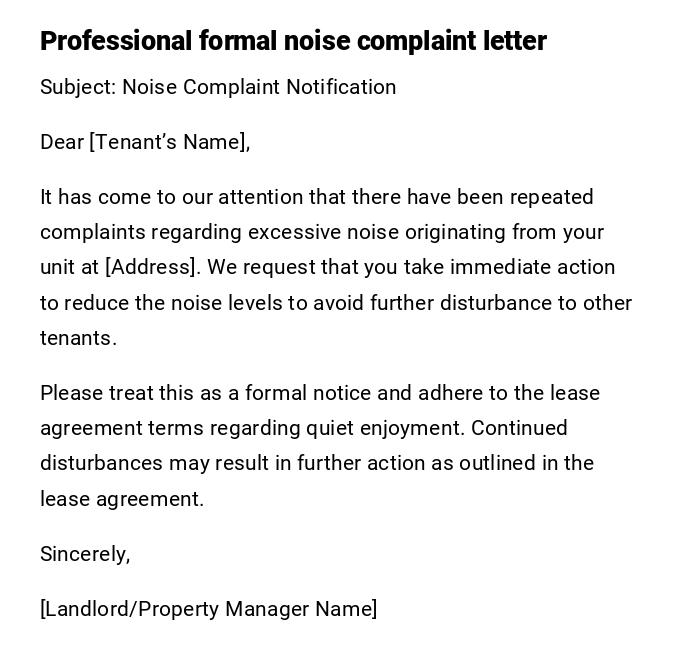
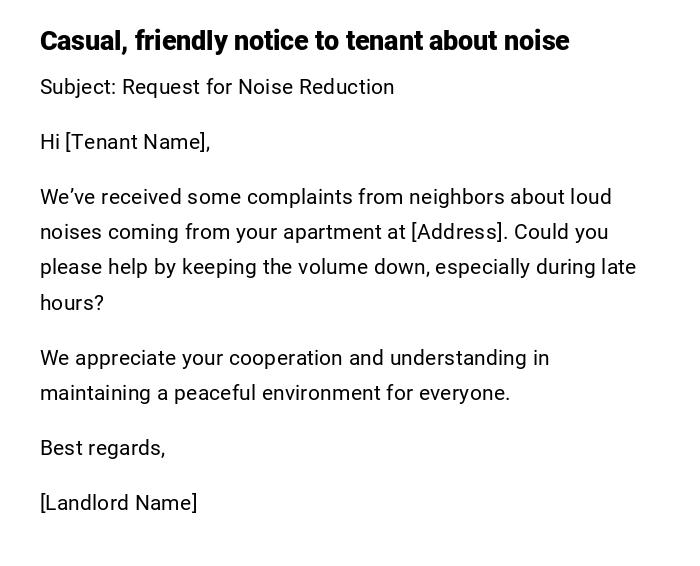
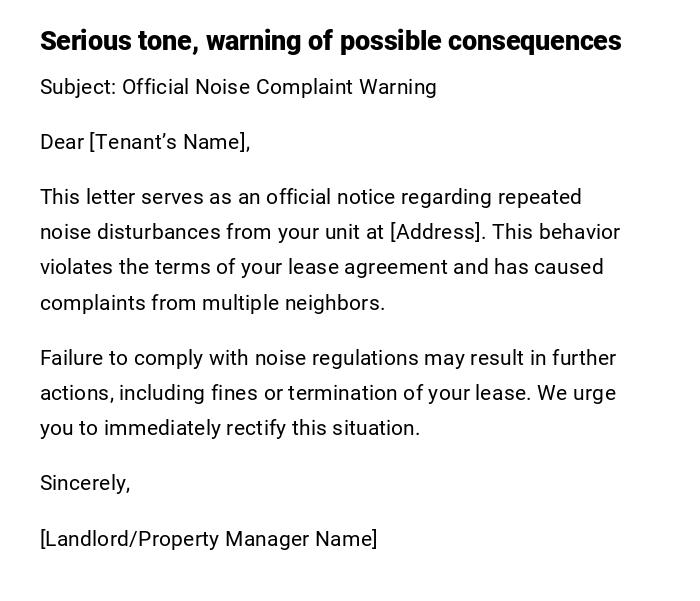
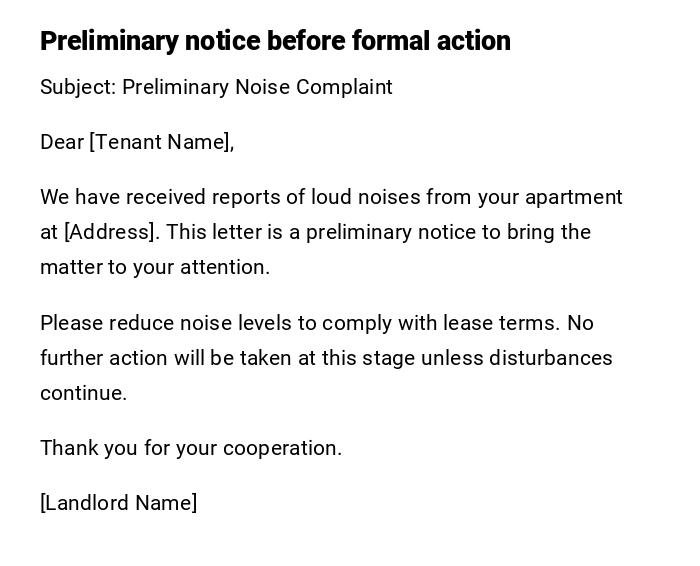
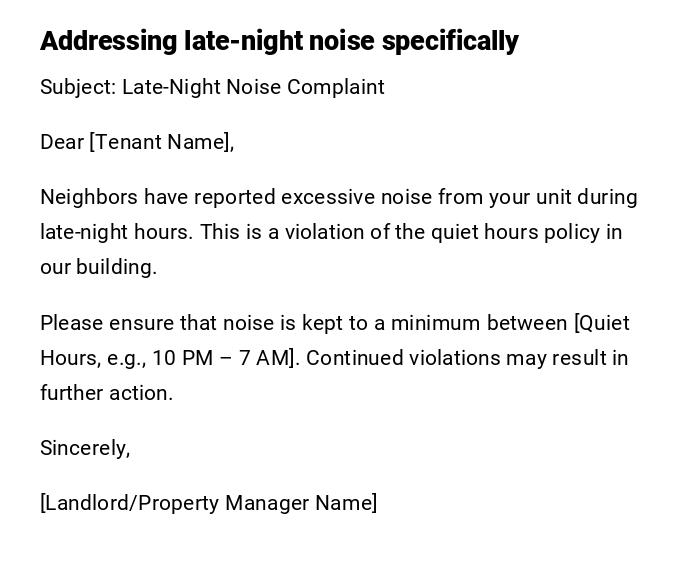
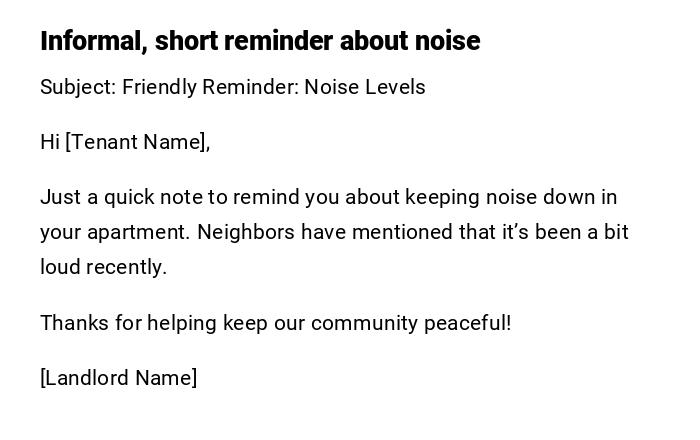
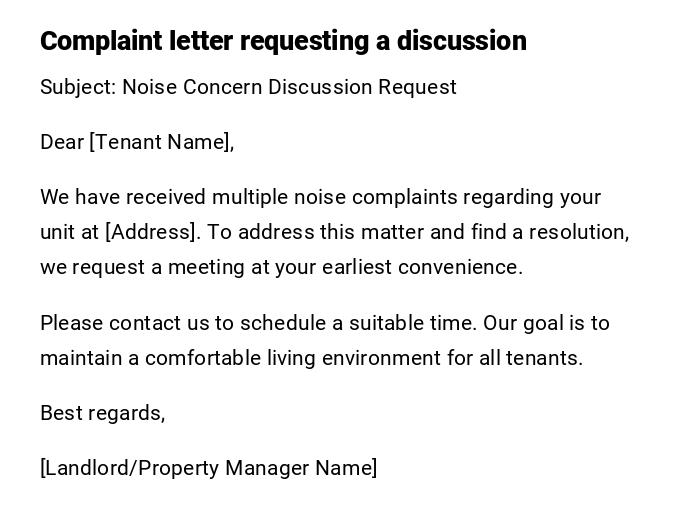
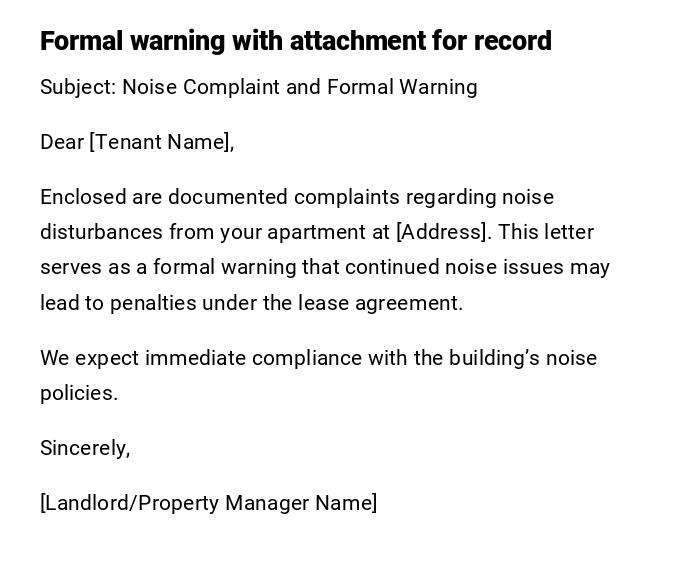

 Download Word Doc
Download Word Doc
 Download PDF
Download PDF